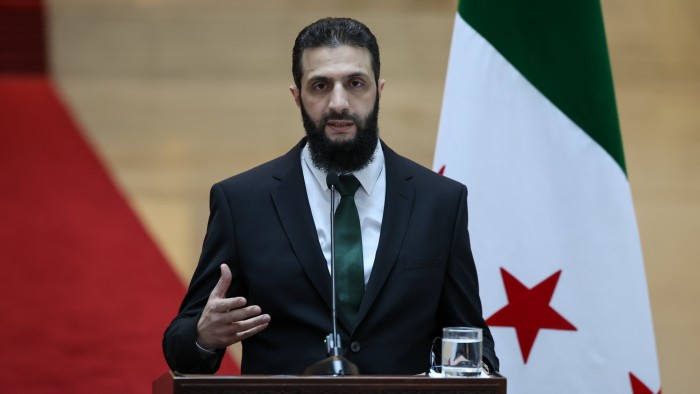
Unlock the Editor’s Digest for free
Roula Khalaf, Editor of the FT, selects her favourite stories in this weekly newsletter.
Syria’s de facto leader Ahmed al-Sharaa has said it could take up to four years for the country to hold its first elections after the fall of former President Bashar al-Assad’s regime.
In his first comments on a possible timeline for key phases of the country’s political transition, Sharaa said “any valid elections will require a comprehensive population census”.
Drafting a new constitution could also take up to three years, said Sharaa, who formerly used the nom de guerre Abu Mohammad al-Jolani, in an interview with Saudi Arabian broadcasters al-Arabiya and al-Hadath on Sunday.
The longer than expected transition could concern western powers who have been urging Sharaa to form an inclusive administration. They are weighing the removal of sanctions on the Syrian state and terrorist designations on Sharaa and Hayat Tahrir al-Sham (HTS), the Islamist movement that led the lightning rebel offensive to unseat Assad.
Earlier this month, HTS appointed Mohamed al-Bashir as Syria’s interim prime minister,
Bashir, who led the civilian administration in Idlib, the north-west region that has been under HTS’s control for years, announced at the time that his cabinet, which is largely made up of HTS members who had roles in the former Idlib administration, would form a caretaker government until March next year.
Sharaa also addressed HTS’s dominant role in the transitional government, telling the broadcasters that “the current form of appointments was a necessity of the stage” and that a “quota system during this period would have destroyed the transitional work”.
Hadi al-Bahra, head of the Syrian National Coalition — an umbrella group of leading Assad opponents during Syria’s civil war — has called for all opposition parties to be included in the transitional government.
He also laid out an 18-month timeline for a political transition, including a six-month period for drafting a new constitution.
Sharaa also confirmed that HTS and other armed factions would be dissolved into new state authorities, although it is not certain whether Syria’s many factions will accept his initiative.
HTS’s dissolution will be announced at a National Dialogue Conference of leading opposition figures, ethnic and religious leaders and some Assad regime officials who did not have military or security roles.
The conference, a date for which has not yet been announced, is also expected to announce the dissolution of the former parliament and cancellation of the former constitution, along with the formation of an advisory council, organisers told Al Jazeera.
One of the most significant factions that remains outside Sharaa’s sphere of influence is the Kurdish-led, US-backed Syrian Democratic Forces, which control a large portion of the country’s north-east.
Sharaa said on Sunday that the HTS-led administration was negotiating with the SDF over the future status of the region.
https://www.ft.com/__origami/service/image/v2/images/raw/https%3A%2F%2Fd1e00ek4ebabms.cloudfront.net%2Fproduction%2F414e8ff5-81b6-4e69-b577-b08e09ee8dc0.jpg?source=next-article&fit=scale-down&quality=highest&width=700&dpr=1
2024-12-29 09:01:12